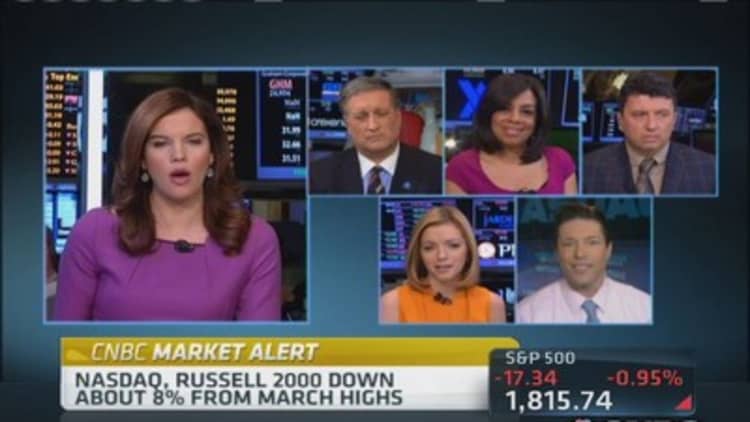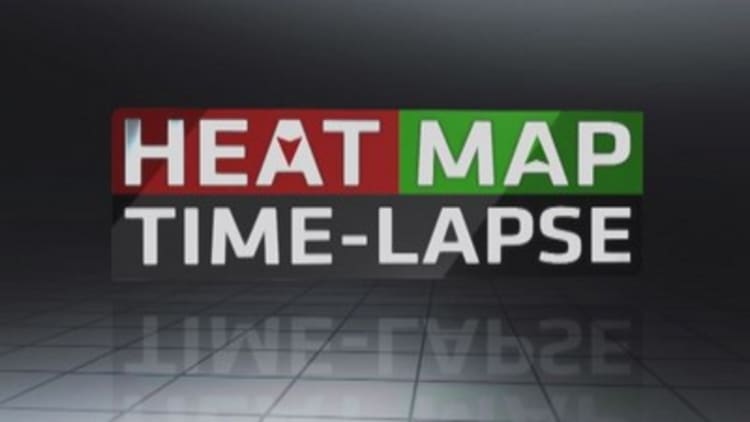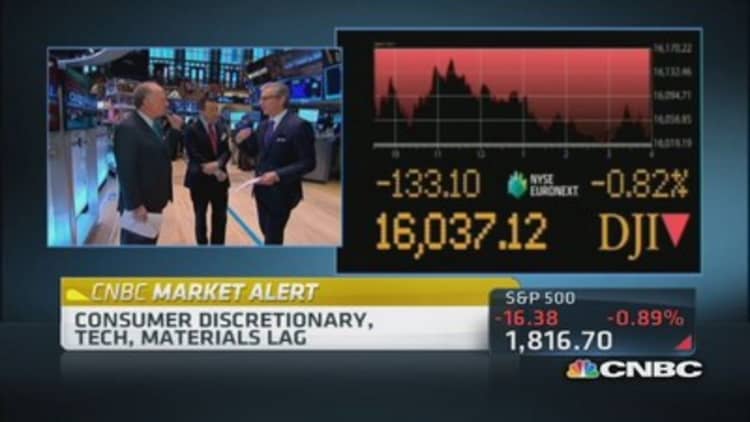
U.S. stocks declined sharply for a second session Friday, with the Nasdaq Composite tallying its third weekly drop, after JPMorgan Chase posted disappointing earnings and Gap reported a decline in sales.
"There's a lot of uneasiness about how far and fast the market ran last year, so any piece of news, even a single earnings report, can have a contagion effect," said Dorothy Weaver, co-founder of Collins Capital.
JPMorgan Chase led declines on the S&P 500 after the bank posted first-quarter earnings below expectations. Gap also fell after the retailer reported a drop in same-store sales, with Janney Capital Markets downgrading its shares to neutral from buy. Wells Fargo, however, reported a better-than-projected rise in first-quarter net profit as the mortgage lender set aside less money to cover bad loans.
"Based on earnings, some bank stocks are doing better than others," said Peter Coleman, who oversees floor trading as director of sales trading for ConvergEx Group.

Shares of Herbalife fell 14 percent after the Financial Times cited people familiar with the matter in reporting the U.S. Department of Justice and the FBI were investigating the multi-level marketing company that hedge fund manager Bill Ackman has alleged is a pyramid scheme.
"We're about 7 percent from the highs, so we're creeping towards what you would classify as a correction, so I wouldn't be surprised, but I don't think we're heading towards bear market territory," Coleman said.
"So far it does not appear to be so much fundamental as a turn in sentiment," said Russ Koesterich, BlackRock's global chief investment strategist, who attributes the recent selloff in high-flying shares to "forced liquidation by hedge funds."
"A lot of investors were long the momentum trade. All of last year's big winners -- biotech, Internet stocks, this is where you've seen the biggest reversal; that momentum trade has basically been broken," he said.
"The losses in an absolute sense outside those sectors have been fairly modest," Koesterich added.
Major U.S. Indexes
After a 155-point dive, the Dow Jones Industrial Average dropped 143.47 points, or 0.9 percent, to 16,026.75, with JPMorgan leading blue-chip losses that included 25 of 30 components. The Dow fell 2.4 percent for the week, its first weekly drop in four.
Falling 2.7 percent from a week ago, the declined 17.39 points, or 1 percent, to 1,815.69, with consumer discretionary hardest hit.
Falling below 4,000 for the first time since early February, the Nasdaq shed 54.37 points, or 1.3 percent, to 3,999.73, leaving the technology-laden index down 3.1 percent for the week, its worst weekly hit since June 2012 and its longest weekly loss streak since late 2012.
The CBOE Volatility Index jumped 7.1 percent to 17.01.
"In the last few selloffs, particularly like last July, we didn't really see the market stabilize until the VIX reached north of 20; I don't think we'll see some stabilization until we get enough panic to get it to 20. I'd be cautious as a buyer until," said Coleman at ConvergEx.
For every shares rising, more than two fell on the New York Stock Exchange, where 815 million shares traded. Composite volume neared 3.8 billion.

On the New York Mercantile Exchange, crude-oil futures for May delivery rose 34 cents to $103.74 a barrel, rising nearly 3 percent from a week ago; gold futures for June delivery dropped 0.1 percent to $1,319.00 an ounce, up 1.2 percent for the week.
The dollar gained against other global currencies and the 10-year Treasury yield fell 3 basis points to 2.623 percent.
Friday's economic reports had the Labor Department reported U.S. producer prices rose the most in nine months in March as the cost of food and services climbed.
"We're seeing the first hint of pricing pressure at the producer level, so an upside surprise in PPI, if deflation is something we're concerned about," said Art Hogan. chief market strategist at Wunderlich Securities.
Wall Street bypassed a report that had U.S. consumer sentiment rising in April to a nine-month high, with the Thomson Reuters/University of Michigan's preliminary April read on confidence coming in at 82.6 versus 80.0 in March.
On Thursday, stocks were slammed, with high-flying technology and biotech shares leading the declines that had the Nasdaq Composite posting its worst session in more than two years.
"Unfortunately we've got a confluence of events where we had a significant selloff yesterday, and Fridays have not been good this year," said Hogan.
—By CNBC's Kate Gibson
More From CNBC.com:


